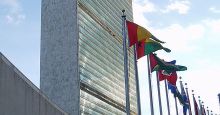The Irish Government was under pressure today at the Human Rights Council in Geneva to clarify whether the Government’s expert group on the implementation of the European Court of Human Rights ruling in the A, B and C v Ireland case will be informed by human rights principles.
National and international human rights organisations speaking at the Human Rights Council’s report on Ireland’s Human Rights expressed concern at the Irish Government’s rejection of recommendations related to abortion and to the implementation of the ruling of the European Court of Human Rights in the case of A, B and C v Ireland.
However, Ambassador Gerard Corr confirmed that the expert group convened to make recommendations in relation to the implementation of the A, B and C judgment will report in July.
The recommendations by Slovenia, Spain, Denmark, Norway, the Netherlands and the UK are fully consistent with the criticisms of Ireland’s restrictive regulation of abortion made by the Treaty Monitoring Bodies including the Committee Against Torture in 2011, the Human Rights Council in 2008 and the CEDAW Committee in 2005.
Meghan Doherty, spokesperson for the Irish Family Planning Association in Geneva, told the UN Human Rights Council that “for Ireland to decline to accept, even partially, any of the six recommendations is unacceptable and amounts to a considered disregard by the Government of its human rights obligations”.
Speaking after today’s session, Niall Behan, CEO of the IFPA, stated “Ireland’s rejection of the recommendations of its peers on women’s reproductive health rights falls short of the duty of all States, particularly those seeking election to the Human Rights Council, to promote and protect all human rights and fundamental freedoms impartially and non-selectively.”
Mr Behan also said, “The report by the expert group in July will recommend a series of options to the Government. In order to satisfy the European Court of Human Rights, however, the Government must promptly enact substantive measures to at least give effect to women’s right to a lawful abortion within the State.”
Abortion in Ireland:
Abortion is against the law in Ireland unless the pregnancy endangers the life of the woman. Ireland’s restrictive laws on abortion are totally out of step with those of its European neighbours. Forty four out of 47 European countries provide for abortion to protect women’s health. The overwhelming consensus throughout Europe allows for some access to legal abortion to protect a woman’s health and well-being, applying a more effective, less punitive approach than that which is in force in Ireland. Since 1980, some 150,000 women have travel abroad to access safe abortion services. This highlights the hypocrisy of Ireland’s abortion regulations which are among the most restrictive in the world.
About A, B & C v Ireland:
In December 2010, the European Court of Human Rights (ECHR) delivered its verdict in the case of A, B & C v Ireland − a landmark challenge to Ireland’s restrictive abortion laws. The Court unanimously found that Ireland’s failure to give effect to the existing constitutional right to a lawful abortion in Ireland when a woman’s life is at risk violates Article 8 of the European Convention on Human Rights
The decision reaffirmed the Supreme Court X Case judgment of 1992 and sent a very strong message to the State that it can no longer ignore the imperative to legislate for the provision of life-saving abortion services.
The case was taken by three women, supported by the IFPA, who travelled abroad for abortion services. They argued that the criminalisation of abortion services in Ireland jeopardised their health and wellbeing, in violation of a number of articles of the European Convention on Human Rights. The case was heard before the Court’s Grand Chamber of 17 judges, which is reserved to hear cases that raise serious questions affecting the interpretation of the European Convention on Human Rights.
In January 2012, the government convened an expert group chaired by Mr Justice Sean Ryan to make recommendations for the expeditious implementation of the judgment of the ECHR.

